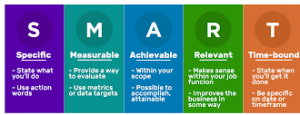Setting S.M.A.R.T Objectives to support your writing goals is one of the most practical and motivational habits to get into. It’s not just about saying, “Today I’m going to write 20,000 words” but more about how you’re going to get there and what steps you need to take to ensure you reach your end goal.
We all have big ideas about what we are going to achieve but this doesn’t just happen and planning and using S.M.A.R.T Objectives to support your writing goals is the best way to stay on track and be more successful in achieving them than ever.
I first learnt about S.M.A.R.T. Objectives when I studied and taught Business Studies and they can actually be applied to any aspect of life. After all we all have goals, right? Things we want to achieve by the end of today, this week, within the next three months, by the time I’m (add your age here).
So let’s see how this works:

Applying S.M.A.R.T to your writing goal.
So let’s say your goal is to write a novel. A novel is complicated and multi-faceted so each aspect will need to be looked at and planned for individually and using S.M.A.R.T will help you approach this logically.
S – you will have to be SPECIFIC about this. So which aspect of your writing are you going to focus on? Is it the research? The main theme? The planning? The feedback? You can’t do everything you need to do at once; different aspects will have different considerations, so break it down and be SPECIFIC.
M – in order to reach the point of achieving your goal you must make what you’re aiming for MEASURABLE in some way. This is how you will measure whether you have been successful in achieving your goal. Is it by the number of pages you have written? Is it by the amount of research hours you have completed? Is it by word-count? Is it in terms of making headway towards your end goal? For example, I aim to have written 3/20 chapters, or 35% of the total book.
A – goals must be ATTAINABLE. And this links to being REALISTIC and TIME-BOUND. You cannot, if you work full-time, expect to sit down in one hour and complete your website or three whole new chapters. So think in smaller ATTAINABLE goals. Aim to complete a certain number of hours or sittings, or a word-count by a certain time or perhaps look at the drop-down links you want or write out your Media Kit. (TIME-BOUND).
R – Don’t rush in and set unrealistic goals for yourself. This will only add pressure and if the stress becomes too much you are less likely to see the project through. So be REALISTIC. Saying to yourself I’m going to write 15,000 words a day or three chapters a day when you work full-time, have family commitments and a busy social life is setting yourself up for failure before you’ve even started. Be kind to yourself and set the bar at a reasonable level. Think about what you could achieve REALISTICally and if you go over and beyond that then it’s a bonus. Sometimes I set my timer for half an hour which forces me to sit and concentrate on my writing for that set period of time…most often I go over this time and I feel so good I’ve been writing uninterrupted for more than I had planned.
T – TIME-BOUND simply means adding a time frame to your goal. Think about when and how you will achieve your goal? When will you work at it? Is it per day, once a week, three hours a day, every weekend for a month? You may put in a date that you aim to complete the goal by.
By being S.M.A.R.T you are more likely to achieve your goals and you will be motivated to continue working towards them and reap the success you deserve!
So, go forth, use S.M.A.R.T to support your writing goals and feel free to share your experience of setting and achieving your goals in this way. I look forward to hearing from you. Good Luck!
Soulla xxx

